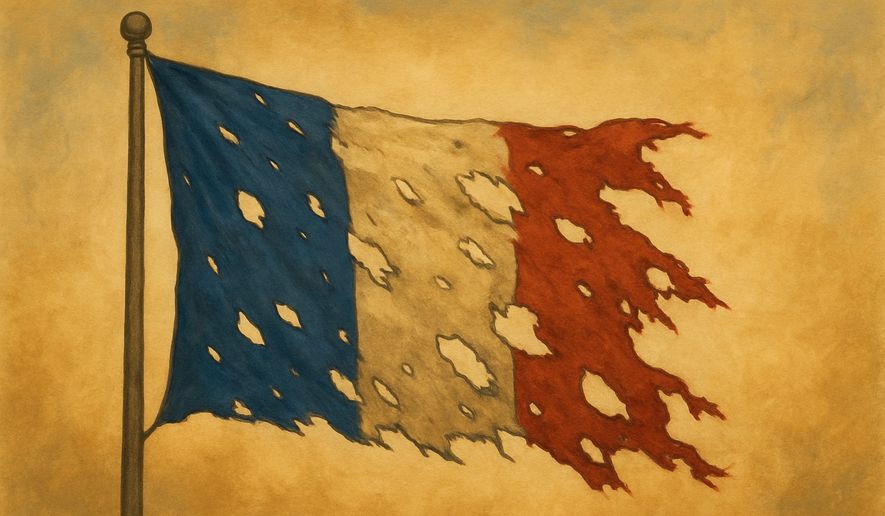OPINION:
In late 2002 and early 2003, in preparation for a United Nations vote on the U.S. invasion of Iraq, French Prime Minister Dominique de Villepin flitted from country to country trying to persuade their leaders to oppose the United States. Mr. de Villepin was asked which side he wanted to win the coming war, and he refused to answer.
Then, some character said, “Going to war without France is like going deer hunting without an accordion. You just leave a lot of useless, noisy baggage behind.” (OK, the character was me.)
The French government set up a website to oppose my joke (www.miquelon.org) and “monitor French bashing.”
When French President Emmanuel Macron said he would formally recognize a Palestinian “state,” President Trump responded by saying, “What he says doesn’t matter. … I like him, but that statement doesn’t carry weight.”
The French government, and probably the French people, felt insulted by Mr. Trump’s statement. Also insulted were those who followed Mr. Macron’s remarks by indicating that they would also recognize a Palestinian state, such as British Prime Minister Keir Starmer, Australian Prime Minister Anthony Albanese and others too insignificant to even mention here.
As Israeli Prime Minister Benjamin Netanyahu has often said, there will be no Palestinian state. As Mr. Trump said, the declarations by Mr. Macron and his followers will have no effect.
Nations have psychologies just like people do, and the French are more sensitive than most others to any insult, but why are they so petulant when it comes to the United States?
France was our original ally. The Marquis de Lafayette and the French navy stood by us during the Revolutionary War. Its troops fought with incredible bravery during the Napoleonic Wars. In 1871, they allowed the Germans to march into Paris.
French generals and their troops were beaten roundly and soundly in the first year of World War I. Their generals would allow an offensive strategy based on the “elan” (dynamism) of their troops, which the Germans defeated quickly.
The French surrender to Germany in June 1940 convinced the world of France’s congenital weakness.
In 1986, when a Berlin nightclub popular with U.S. troops was bombed, killing two and injuring about 200, France prohibited our F-111s from flying in French airspace to bomb Libya, which was responsible for the bombing. The loss of one aircraft was possibly a result of the mission’s complexity because of the denial of the use of French airspace.
France probably has an inferiority complex because the U.S. had to bail it out of two world wars. The weakness of France is now being displayed by Mr. Macron’s unpopularity and apparent inability to hold a government together.
When Sebastien Lecornu resigned as French prime minister after less than a month in office, he brought about a new French political crisis, which was greeted with a typical French shrug. It apparently didn’t matter. The opposition parties — and in France, there are several — mostly agreed that Mr. Macron would appoint a new prime minister, the fifth in little over a year. Mr. Lecornu resigned on a Monday and was reappointed that Friday.
As French President Charles de Gaulle once said, “How can you govern a nation that has 246 varieties of cheese?” Mr. Macron has no idea except to bow to the wishes of France’s most vocal minorities, as he did in recognizing the Palestinian “state.” He has also suggested that France might sanction Israel economically.
Mr. Macron is trying to distract French voters from France’s massive economic problems. The French poverty rate is at its highest, 15.4%, since records of it began. Its public debt is over 114% of its gross domestic product. The debt keeps rising while Mr. Macron favors budget cuts entirely disfavored by the public. His passage of a requirement that the retirement age would gradually increase from 62 to 64 is also enormously unpopular.
As British newspaper The Independent wrote, French politics has descended into a tragicomedy. Mr. Macron faces the choice of resigning or dissolving the French Parliament. Calling new elections risks his resignation and a further-right government headed by someone such as Marine Le Pen or Jordan Bardella, her protege and leader of her National Rally party.
Mr. Macron is increasingly isolated in French politics. His refusal to resign and his refusal to call new elections stand as a challenge to the electorate.
What ails France ails most of Europe. Aging populations and extreme debt are unsustainable for their quasi-socialist states, and they won’t agree that they are in an undeclared war with Russia despite the invasion of Ukraine.
France will always be France, regardless of whether Mr. Macron resigns, petulant and opposing President Trump at every opportunity. If only Lafayette were alive to remind France of whose side it’s really on.
• Jed Babbin is a national security and foreign affairs columnist for The Washington Times and a contributing editor for The American Spectator.




Please read our comment policy before commenting.